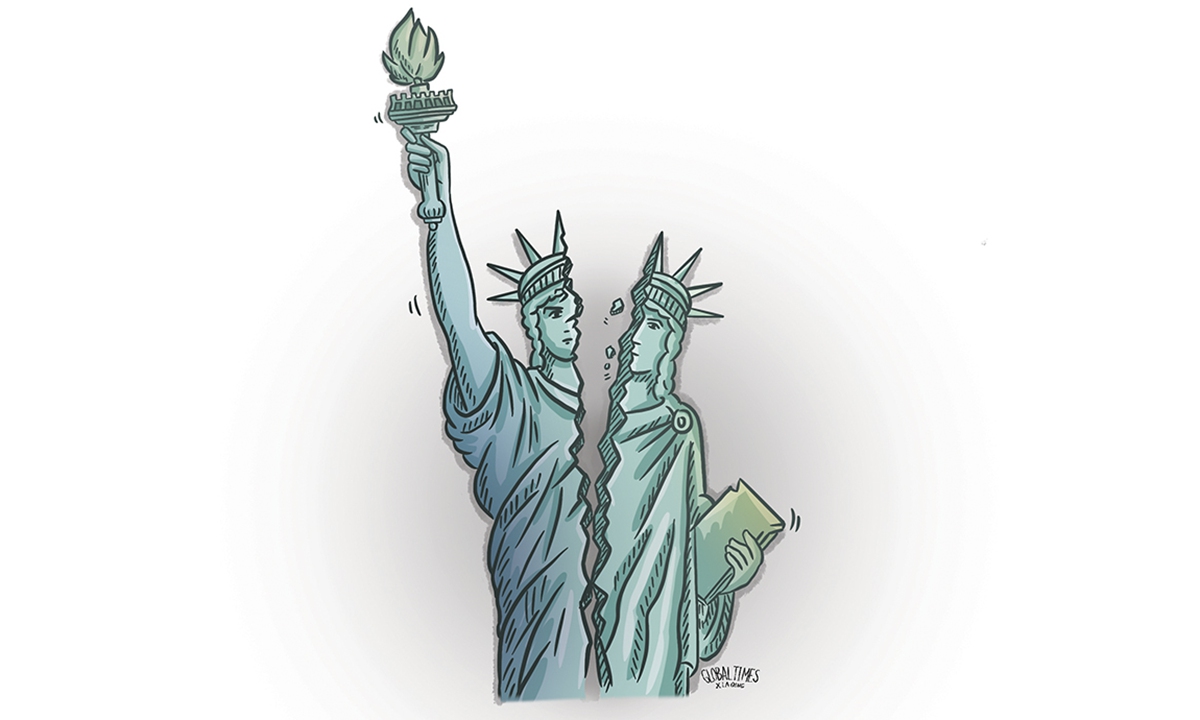
Illustration: Xia Qing/GT
Growing political polarization within the US is increasingly serving as a potent catalyst propelling the burgeoning "prepper" movement forward, reflecting a broader societal disquietude regarding the nation's political and economic trajectory.
Spanning the entire ideological spectrum, Americans are grappling with mounting apprehension surrounding the state of the economy and the increasingly fractured political landscape. This pervasive sense of uncertainty has engendered a marked uptick in individuals harboring profound distrust toward both governmental institutions and societal frameworks, prompting them to adopt a proactive stance toward self-sufficiency and preparedness.
Recent data cited by Reuters, drawing from comprehensive research on the subject, indicates a staggering doubling in the number of "preppers" in the US since 2017, with an estimated 20 million individuals now identifying as adherents of this movement. What was formerly primarily associated with far-right ideologies has now permeated mainstream America, with individuals hailing from diverse political backgrounds embracing practices such as firearm ownership, stockpiling essential supplies and fortifying their residences against potential crises.
While prior analyses predominantly focused on the ramifications of events such as the COVID-19 pandemic and its attendant disruptions, along with incidents like the Texas power grid failure, attention is increasingly being redirected toward the broader backdrop of political polarization within the country.
The occurrences of recent years, including the surge of civil unrest sparked by movements such as Black Lives Matter, have laid bare the deep-seated fault lines running through American society. This polarization transcends mere ideological and policy disagreements, encompassing fundamental questions regarding the role of government, the essence of democracy and the legitimacy of societal institutions.
Set against this backdrop, episodes such as the storming of the Capitol in 2021 serve as stark reminders of the fragility of democratic norms and the potential for political instability to escalate into full-blown crises. Such events coupled with ongoing partisan skirmishes and heightened rhetoric across the political spectrum have contributed to a pervasive sense of uncertainty and insecurity among the populace.
In addition to political tumult, concerns regarding environmental degradation and climate change are also assuming an increasingly prominent role in shaping the trajectory of the "prepper" movement. The escalating frequency and intensity of extreme weather events, juxtaposed with the gradual but inexorable march of climate change, have underscored the imperative for individuals to prepare for a future characterized by environmental instability and ecological disruption.
In response to these multifaceted challenges, the "prepper" movement has evolved from a fringe subculture to a mainstream phenomenon, with individuals from all walks of life embracing the principles of self-reliance and preparedness as indispensable strategies for navigating an uncertain world.
As the narrative surrounding prepping continues to evolve, one thing remains abundantly clear: the imperative of readiness transcends political divides. Spurred by political mistrust, environmental apprehensions, or a fusion of both, the call to self-sufficiency resonates across the entire ideological spectrum, reflecting a shared determination to confront uncertainty with resilience and resolve.
The growing "prepper" movement in the US is a direct response to the deepening political polarization and societal unease gripping the nation. As Americans grapple with mounting apprehensions about the economy, political stability and the reliability of societal institutions, many are turning to self-reliance and preparedness as a means of asserting control in uncertain times.
The trajectory of the "prepper" movement reflects a broader shift toward individual empowerment and autonomy in the face of perceived threats. From concerns about government overreach to fears of environmental catastrophe, this movement represents a diverse array of motivations united by a shared desire to mitigate risk and safeguard their families and communities.
Moreover, the evolution of the "prepper" movement from a fringe subculture to a mainstream phenomenon underscores the depth of societal disquietude and the widespread desire for proactive solutions to pressing challenges. In an era marked by political polarization and deepening divisions, the "prepper" movement serves as a unifying force, transcending traditional ideological boundaries in its call for preparedness and resilience.
Looking ahead, this movement is likely to continue evolving in response to shifting societal dynamics and emerging threats. As technological advancements, environmental changes and geopolitical shifts reshape the landscape of risk, "preppers" will remain at the forefront of efforts to adapt and thrive in an increasingly uncertain world.
The author is a Prague-based American journalist, columnist and political commentator. opinion@globaltimes.com.cn




